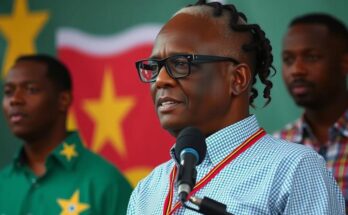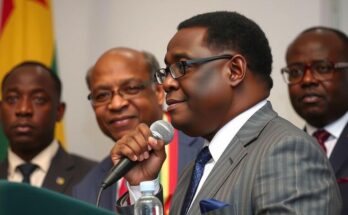In light of the upcoming general election in Ghana, Professor Jeffrey Haynes asserts that economic issues, rather than social matters like the anti-LGBTQ bill, will heavily influence voter decisions. He highlights concerns such as the cost of living and unemployment as pivotal factors, suggesting that many Ghanaians are more focused on economic stability than on legislative debates regarding LGBTQ rights.
As Ghana approaches its general election in 24 days, Professor Jeffrey Haynes, a political expert from the Metropolitan University in the UK, asserts that economic concerns will primarily shape voter preferences. During the ‘Kronti ne Akwamu’ lecture series on November 12, 2024, he emphasized that challenges such as the rising cost of living, youth unemployment, and issues related to illegal mining will dominate the electoral discourse over social matters like the proposed anti-LGBTQ bill. Professor Haynes remarked that Ghanaians are more likely to prioritize their immediate economic difficulties rather than social legislation. He expressed skepticism about the significance of the anti-LGBTQ bill, stating, “I think it is a side issue. I think it is something that has been introduced to deflect away from the failings of government.” Furthermore, he observed that voters desire a government characterized by integrity, transparency, and accountability in addressing the country’s pressing issues, rather than focusing on legislative debates regarding LGBTQ rights.
The context of this election commentary highlights a critical moment in Ghanaian politics where economic challenges severely impact the electorate’s mindset. The country’s current state includes a high cost of living, with rising prices affecting citizens’ livelihoods, alongside a troubling rate of youth unemployment. Additionally, illegal mining activities, known as galamsey, have generated significant public concern regarding environmental degradation and governance. These pressing matters are influential in shaping voters’ decisions, overshadowing social issues such as the anti-LGBTQ bill that has garnered parliamentary attention. This commentary comes amid Ghana’s Parliament calling for President Nana Akufo-Addo’s endorsement of the controversial anti-LGBTQ bill, previously suggested to await a Supreme Court ruling.
In summary, as Ghana gears up for its upcoming election, economic issues such as living costs and youth employment are likely to take precedence in voters’ considerations over social issues like the anti-LGBTQ bill. Professor Haynes’ insights suggest that many Ghanaians prefer to focus on the government’s capacity to manage economic crises rather than engage in the debates surrounding the anti-LGBTQ legislation, which he suggests serves as a distraction from more pressing governmental failings. This perspective challenges the discourse around social policies, reaffirming the primacy of economic stability in electoral decisions.
Original Source: www.ghanaweb.com



